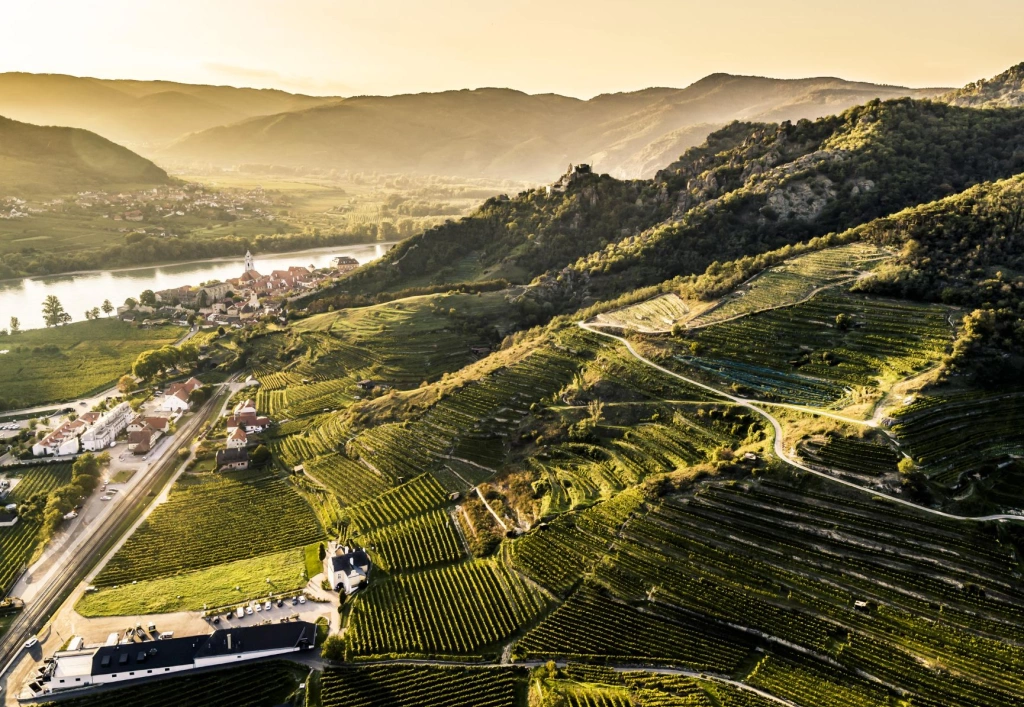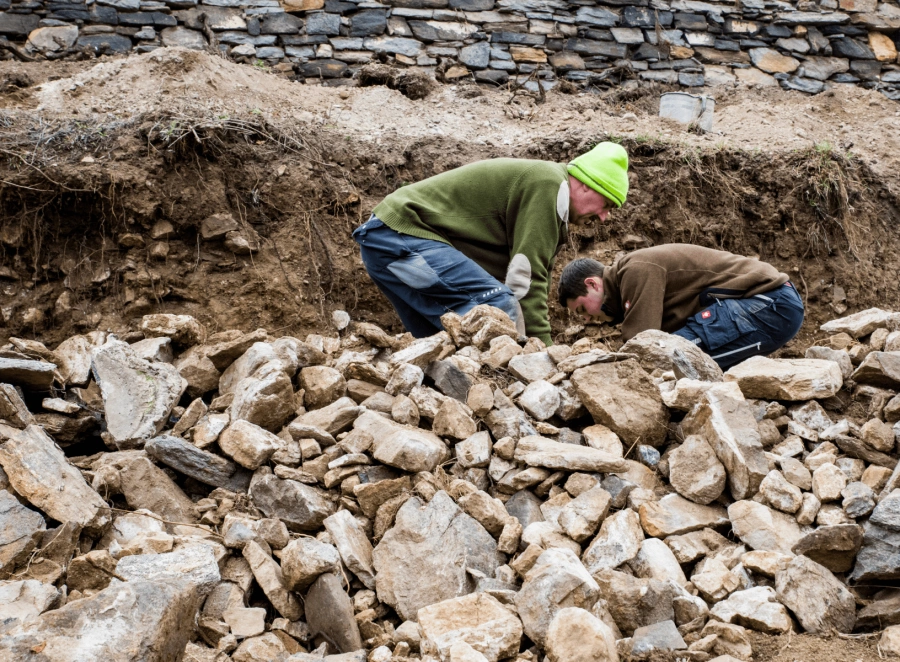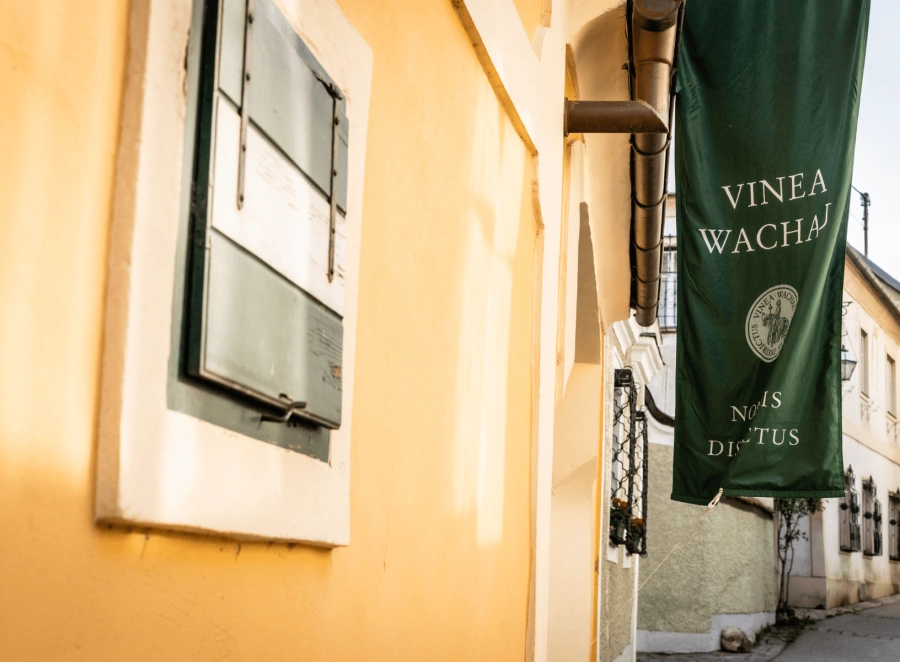
Vinea Wachau unveils Austria’s first sustainably certified vintage

The Wachau Wine Spring in the first weekend of May marks the traditional start of the new wine year in Austria’s most renowned wine region. But this year it will also be a new milestone in the history of the regional protection association Vinea Wachau. This is because all the wines with the Steinfeder®, Federspiel® and Smaragd® designations from the newly launched 2023 vintage will carry the rigorous ‘Sustainable Austria’ certification. In addition to harvesting by hand and only using grapes from the Wachau region, Vinea Wachau’s member wineries now also share another core value: an official commitment to sustainability.
Wachau's pioneering role
Around 1,300 hectares of vineyards, many of them on steep stone terraces, have undergone certification in a collaborative process over the past three years. This makes the Wachau the first and only wine region in Austria that is completely sustainable. Once again, the Wachau is proving that it plays a pioneering role for long-term concepts in Austrian viticulture. This is not the first major sustainability project in the Danube Valley region, which stretches between Melk and Krems. For many years, a major pest, the grape berry moth, has been controlled organically throughout the Wachau, eliminating the use of insecticides. "This is also unique in the Austrian wine landscape," says Leo Alzinger, a board member of Vinea Wachau.

While the time-consuming work on the steep slopes of the World Cultural Heritage region is part of everyday life for most Wachau winegrowers, it was the bureaucratic effort that appeared to be a hurdle for many. "All work steps have to be recorded and documented, which is particularly time-consuming in small vineyard parcels. As an association, we offered a lot of support here. On the other hand, the high proportion of manual labour in the terraces promotes biodiversity and conserves resources from the outset," explains Emmerich H. Knoll, the Chair of Vinea Wachau.
Holistic thinking
Nearly as important as the sustainable certification itself was the holistic thinking that it inspired among the winegrowers to consolidate the Wachau’s position as a leading region, even in challenging times. "Developing an understanding of the overall impact of a business and the entire region was an exciting task. The diverse business structures in Wachau, from grape producers and part-time winegrowers to the Domäne Wachau cooperative, presented very individual challenges. We are proud that we have won over so many winegrowers in three years," says a delighted Mr. Knoll.
For example, a biodiversity report for the whole wine region was compiled – another first in Austria. This report, published in December 2023, analyses the relationships between the cultural landscape, flora and fauna and cultivation and provides the winegrowers with tailored recommendations. These relate to the promotion of beneficial organisms such as insects and birds, the containment of invasive plant species, the support of humus formation and the prevention of erosion.
The biodiversity initiative includes the following measures:
Confusing the grape berry moth using synthesized pheromone diffusers
Setting up bird of prey perches and nesting boxes for rare bird species
An under-vine planting project in collaboration with Domäne Wachau and 10 other winegrowers
Seminars on environmentally sensitive topics as part of the ‘Wachau Quality Offensive’ training programme
Further details on the natural environment of the Wachau can be found at the following link: https://www.vinea-wachau.at/en/the-wine-region/nature

About the ‘Sustainable Austria’ certification:
The ‘Sustainable Austria’ certification programme, developed by the Austrian Winegrowers’ Association, has enjoyed a pioneering position in the international wine industry since it was introduced in 2015.
Scientists studied all production measures carried out throughout the winegrowing year and rated them for their ecological, economic and social sustainability. The results were used to create an online tool through which Austrian vintners can assess the sustainability of their production processes, including planting a new vineyard, growing grapes, producing wine and marketing. In total, the sustainability assessment comprises around 360 measures.
Once wine producers have entered all the necessary information online and fulfilled all the prerequisites, they can then apply for certification by an independent external inspection company (LACON or agroVet), which conducts an audit at the winery. Certified producers are authorised to use the ‘Sustainable Austria’ seal for the year following certification.
More about the certification ‘Sustainable Austria’
About Vinea Wachau
The ‘Vinea Wachau Nobilis Districtus’ area protection association, founded in 1983, has nearly 170 wine-/grape producing members. Member wineries must have their headquarters in the Wachau, farm exclusively in the Wachau (only vineyards in an adjacent community that belong to a Wachau winery are also included), harvest by hand and are prohibited from buying in grapes or wine from other regions. Vinea Wachau developed three categories to make the Wachau wine styles as comprehensible and transparent as possible: Steinfeder®, Federspiel® and Smaragd®. Only Vinea Wachau members can use these designations for their wines, which are made in a style which reflects regional typicity: dry white wine, without any addition of sugar or detectable wood influence.
Wachau = Sustainable
What does "sustainable" certified actually mean?
A public certification body inspects the business practices of a winery. The process takes at least one year and covers all work in the vineyard and cellar. Not only is attention paid to ecological working methods, but social and economic parameters are also checked.
What is the advantage of such a certification for a company or region?
First, certification is a guarantee for consumers that this wine has been produced ethically and that neither the environment nor employees have been exploited. Shops, specialist retailers and restaurants can also offer certified wines with a clear conscience. As a result, a number of wine producing countries have developed sustainability certifications in recent years.
How many Wachau wineries have been certified?
All bottlers and their grape suppliers have undergone the certification process, except for the smallest member wineries with very low production volumes, which only had to implement grape certification. More than 150 wineries from the Wachau are therefore proactively certified.
Are all wines from the 2023 vintage already certified?
Yes, all Wachau wines that fall into one of the three Vinea Wachau categories (Steinfeder, Federspiel and Smaragd) are sustainably certified. Since the 2023 vintage, certification has been one of the mandatory conditions for Vinea wines – together with a ban on adding any form of sugar, mandatory hand-harvesting and the guarantee of origin.
What is the difference between sustainable and organic certification?
Organic-biological certification focuses on soil cultivation and the use of authorised products in crop protection. Sustainable certification also includes elements such as fuel consumption, soil compaction, energy consumption, waste avoidance and social parameters such as employee working conditions.
Is 'organic' or 'sustainable' stricter?
There is no clear answer to this question. Organic farming is stricter in terms of the use of pesticides, but "sustainable" is more rigorous in terms of the use of resources.
Why did Vinea Wachau choose ‘sustainable‘ instead of ‘organic‘?
Many businesses in the Wachau are already certified organic. Some winegrowing villages (Rossatz) are absolute pioneers in Austria in this respect. For Vinea Wachau, however, it was important to include all businesses, including small, part-time wineries, in the certification process. It was primarily about bringing a holistic view to viticulture: for example, the connections between tractor passages and the diversity of soil organisms, or between the diversity of grasses and that of beneficial organisms. Before adopting an organic recipe, one should understand the complex interplay of nature and recognise one's own contribution to it.
Independently of sustainable certification, Vinea Wachau also has an organic certification project underway.
What are the challenges for sustainable certification?
Many wineries have been working sustainably for a long time, but certification requires proof. This requires records and documentation, which requires a substantial time investment for many winegrowers. These records provide valuable information: for example, clearly showing the numerous steps involved and how many hours of work are invested in each bottle of wine.
How did the Wachau manage to convince all businesses of the certification process so quickly?
The Wachau is one of Austria’s smallest wine regions with relatively small structures. For more than 40 years, the member wineries of Vinea Wachau have been committed to processing grapes exclusively from the Wachau. The bottlers are therefore dependent on the grape suppliers in the region – and vice versa. This close interlinking has led to a well-functioning collaboration with strong players on both sides for decades. Domäne Wachau is particularly important in this context. The yield from more than 400 hectares of Wachau vineyards is delivered to this cooperative. Domäne Wachau has an international reputation as a model cooperative, not only for its quality wines, but also its excellent cooperation with members.
Why is the cultural landscape of the Wachau beneficial for certification?
Sustainable certification covers a whole range of areas across the sustainability categories: climate, soil, water, energy, biodiversity, materials, quality, social and economic factors.
As the aim is to take a holistic view of work and economic activity, different points are awarded in each area depending on the work step. For example, a large proportion is accounted for by the combustion of fuel generated by tractor usage (e.g. for soil cultivation and plant protection). As the majority of Wachau vines grow on steep, narrow terraces where only manual labour is possible, this area by its very nature scores a particularly high number of "good points" for the wineries.
Why is the Wachau the first wine region in Austria to be certified sustainable?
With 1,300 hectares, the Wachau is one of the smaller regions in Austria. However, its greatest advantage lies in the close cooperation between the farms. Numerous collaborative projects have already been realised in recent years, meaning that there are already well-established and functioning processes in place. This also proved to be a great advantage for sustainability certification.
Is there any other area in the world that is already fully certified?
This is unknown as there is no international sustainability register. In Austria, the Wachau is the first region – but it could be the first certified winegrowing region in the world.















